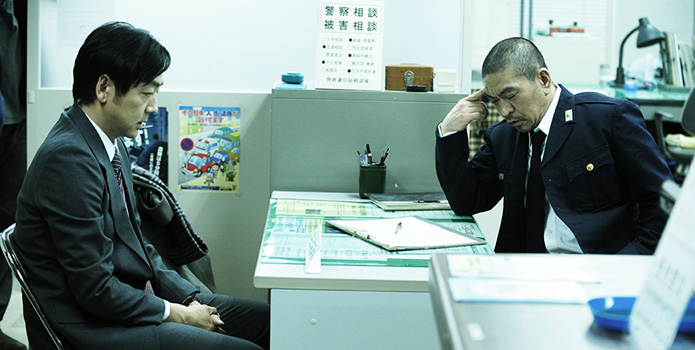 Japan has a film rating system very similar to ours. It is designated by the letter “R“ followed by the minimum age that is allowed to enter the theater. For example, if a movie were rated “R13,” no one under the age of 13 would be able to buy a ticket. With that being said, Director Hitoshi Matsumoto’s “R100” is, you guessed it, not supposed to be viewed by anyone under the age of 100. Because there aren’t too many people that old, the kind folk at the AFI Fest allowed a crowded midnight audience to watch the motion picture.
Japan has a film rating system very similar to ours. It is designated by the letter “R“ followed by the minimum age that is allowed to enter the theater. For example, if a movie were rated “R13,” no one under the age of 13 would be able to buy a ticket. With that being said, Director Hitoshi Matsumoto’s “R100” is, you guessed it, not supposed to be viewed by anyone under the age of 100. Because there aren’t too many people that old, the kind folk at the AFI Fest allowed a crowded midnight audience to watch the motion picture.
The film revolves around a single father named Takafumi  Katayama (Nao Omori) who, after witnessing his wife fall terminally ill, signs up for an exclusive bondage club in order to feel some pain of his own. The society Takafumi joins isn’t just your average S&M joint—from what I’ve been told of course—because it features an added, secret component—the element of surprise. Soon, the ailing father begins to stumble across dominatrices everywhere he turns. Hiding at work, at his house, even at the local sushi restaurant. Takafumi’s entire world might not be safe anymore, but it’s certainly a lot kinkier.
Katayama (Nao Omori) who, after witnessing his wife fall terminally ill, signs up for an exclusive bondage club in order to feel some pain of his own. The society Takafumi joins isn’t just your average S&M joint—from what I’ve been told of course—because it features an added, secret component—the element of surprise. Soon, the ailing father begins to stumble across dominatrices everywhere he turns. Hiding at work, at his house, even at the local sushi restaurant. Takafumi’s entire world might not be safe anymore, but it’s certainly a lot kinkier.
In no time, however, pain turns deadly. After saliva bondage—I’ll spare you the disgusting spoilers—goes horribly, horribly wrong, Takafumi finds himself with accidental blood on his hands. Having nowhere to hide, and an entire bondage army bearing down on him, Takafumi’s once sullen life has unintentionally been swallowed up in a cyclone of crazy. Things only get even more bizarre after the character decides he sort of likes this new lifestyle.
Weird, absurd, and deeply creative, Matsumoto’s tale is one of the strangest explorations into the degeneration of the male psyche I have ever seen. Takafumi is deeply depressed when we first meet him, and Omori plays the part as if he had just returned home from a funeral. The character somehow finds solace in being beaten, burned, and harassed by strange women.
As he allows these dominatrices to perform increasingly risqué procedures, though, there was bound to be a breaking point. Omari’s Takafumi comes off as being slightly insane all along, but when that final switch is finally flipped, the actor’s fall from grace is absolutely hilarious to watch.
Matsumoto’s boldness as a director and storyteller comes to the forefront with the addition of an extended side story completely unrelated to Takafumi’s plight. Set around a fictional 100-year-old director, Matsumoto creates an alternate reality where this old-timer is the actual filmmaker behind “R100” and it is his last film before he  dies. Complete with studio executives that can’t believe they’re allowing this movie to be made, this trippy side plot adds another layer of humor to the story. It also multiplies the overall level of befuddlement by about 50.
dies. Complete with studio executives that can’t believe they’re allowing this movie to be made, this trippy side plot adds another layer of humor to the story. It also multiplies the overall level of befuddlement by about 50.
While “R100” isn’t explicitly violent or sexual, I do have to agree with the title. It’s probably going to take me until I’m 100 years old to figure out what was going on in this film. Matsumoto’s darkly humorous tale has everything from S&M loving men to the Guinness World record holder for the tallest actress in Hollywood (Lindsay Kay Hayward) in it. The result is positively puzzling and more than just a little unusual. Yet there is no mistaking the spirit in which Matsumoto crafts his narrative. “R100” has a lively, beating heart and will certainly satisfy that niche audience that loves Japanese absurdist cinema.
“R100” premiered during the AFI Fest in Hollywood California on November 10th as part of the Midnight section of the festival. It was screened to a completely sold out crowd and was shown again on Monday, November 11th at 1:30 PM at the Chinese 2 Theater. To learn about ticket options for future screenings, head to afifest.afi.com.
to afifest.afi.com.
AFI FEST presented by Audi is a celebration of global cinema and today’s Hollywood – a showcase for the best festival films of the year and an opportunity for master filmmakers and emerging artists to come together with audiences in the movie capital of the world. AFI FEST is the only festival of its stature that is free to the public.
By David Morris














